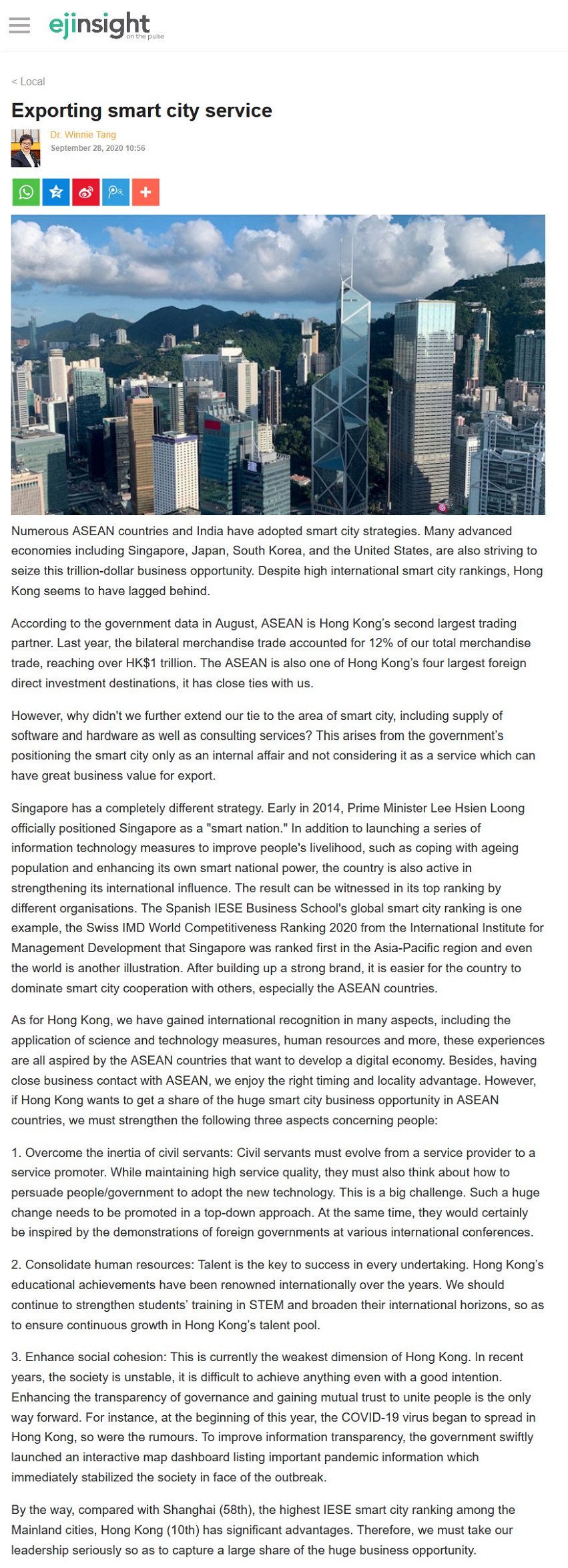網上版請按此

Exporting smart city service
Numerous ASEAN countries and India have adopted smart city strategies. Many advanced economies including Singapore, Japan, South Korea, and the United States, are also striving to seize this trillion-dollar business opportunity. Despite high international smart city rankings, Hong Kong seems to have lagged behind.
According to the government data in August, ASEAN is Hong Kong's second largest trading partner. Last year, the bilateral merchandise trade accounted for 12% of our total merchandise trade, reaching over HK$1 trillion. The ASEAN is also one of Hong Kong's four largest foreign direct investment destinations, it has close ties with us.
However, why didn't we further extend our tie to the area of smart city, including supply of software and hardware as well as consulting services? This arises from the government's positioning the smart city only as an internal affair and not considering it as a service which can have great business value for export.
Singapore has a completely different strategy. Early in 2014, Prime Minister Lee Hsien Loong officially positioned Singapore as a "smart nation." In addition to launching a series of information technology measures to improve people's livelihood, such as coping with ageing population and enhancing its own smart national power, the country is also active in strengthening its international influence. The result can be witnessed in its top ranking by different organisations. The Spanish IESE Business School's global smart city ranking is one example, the Swiss IMD World Competitiveness Ranking 2020 from the International Institute for Management Development that Singapore was ranked first in the Asia-Pacific region and even the world is another illustration. After building up a strong brand, it is easier for the country to dominate smart city cooperation with others, especially the ASEAN countries.
As for Hong Kong, we have gained international recognition in many aspects, including the application of science and technology measures, human resources and more, these experiences are all aspired by the ASEAN countries that want to develop a digital economy. Besides, having close business contact with ASEAN, we enjoy the right timing and locality advantage. However, if Hong Kong wants to get a share of the huge smart city business opportunity in ASEAN countries, we must strengthen the following three aspects concerning people:
1. Overcome the inertia of civil servants: Civil servants must evolve from a service provider to a service promoter. While maintaining high service quality, they must also think about how to persuade people/government to adopt the new technology. This is a big challenge. Such a huge change needs to be promoted in a top-down approach. At the same time, they would certainly be inspired by the demonstrations of foreign governments at various international conferences.
2. Consolidate human resources: Talent is the key to success in every undertaking. Hong Kong's educational achievements have been renowned internationally over the years. We should continue to strengthen students' training in STEM and broaden their international horizons, so as to ensure continuous growth in Hong Kong's talent pool.
3. Enhance social cohesion: This is currently the weakest dimension of Hong Kong. In recent years, the society is unstable, it is difficult to achieve anything even with a good intention. Enhancing the transparency of governance and gaining mutual trust to unite people is the only way forward. For instance, at the beginning of this year, the COVID-19 virus began to spread in Hong Kong, so were the rumours. To improve information transparency, the government swiftly launched an interactive map dashboard listing important pandemic information which immediately stabilized the society in face of the outbreak.
By the way, compared with Shanghai (58th), the highest IESE smart city ranking among the Mainland cities, Hong Kong (10th) has significant advantages. Therefore, we must take our leadership seriously so as to capture a large share of the huge business opportunity.
Dr. Winnie Tang
Adjunct Professor, Department of Geography, Faculty of Social Sciences and Faculty of Architecture, The University of Hong Kong